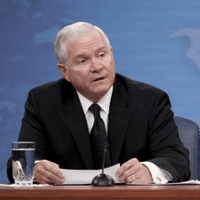On June 10, Robert Gates ended his last major policy speech in Europe as defense secretary with his most public rebuke ever regarding Europeans' failure to provide adequate defense resources to the trans-Atlantic alliance. Gates complained that NATO had finally become what he had long feared: a "two-tiered alliance" divided between those few allies that engage in "hard" combat missions on one hand, and the overwhelming majority of members that can only contribute extensively to "soft" noncombat operations like humanitarian, peacekeeping and training missions on the other. Gates correctly noted that proposed NATO-wide reforms and efficiency measures would at best have a limited impact unless the allies spend more on defense.
Before an audience at the influential Security and Defense Agenda in Brussels, Gates stressed the injustice and political impossibility of perpetuating a situation in which some NATO members are "apparently willing and eager for American taxpayers to assume the growing security burden left by reductions in European defense budgets."
According to Gates, whereas during the Cold War, the United States and the other NATO members spent roughly equal sums on defense, the United States now accounts for 75 percent of all NATO defense spending, at a time when the massive $1.4 trillion U.S. budget deficit could soon force reductions in U.S. defense allocations.

